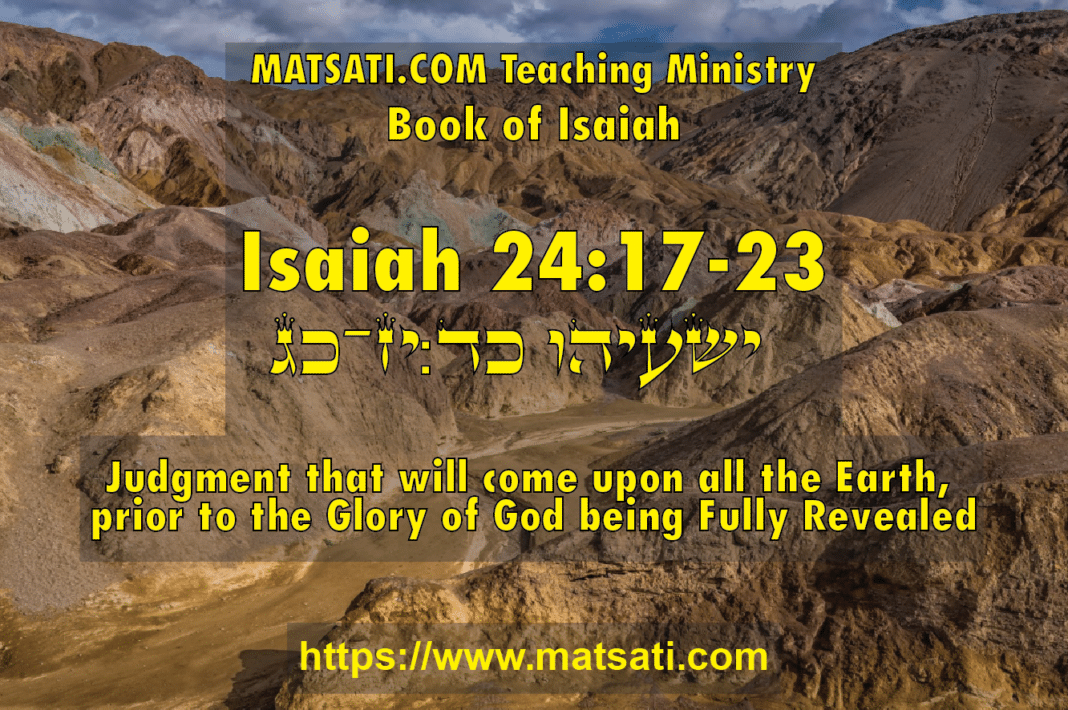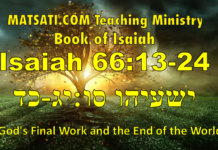Isaiah 24:17-23
The remainder of chapter 24 Isaiah concludes with a description of the judgment that will come upon all the earth, prior to the glory of God being fully seen (Isaiah 24:14-15). In this last section of Isaiah, he is trying to provide a picture of why it is not wise to rely upon the world for joy, happiness, and the essential things for life. The impression given is that of a world that has completely gone crazy in sin and rebellion. Because of the world’s sinfulness, the Lord God Almighty himself is involved in causing confusion, and the lack of understanding. This means that God gives one what he wants. If a person wants lies, deception, conspiracy, the Lord is going to allow these things unless one is actively seeking God to not be deceived. Setting our focus upon the Lord and upon His holy Word is the only way to stand secure on solid ground and not be deceived by every wind and doctrine. (Ephesians 4:14) These things reveal to us that in the end it is the Lord God Almighty who reigns. The point is that all kingdoms, all peoples, there are none that are eternal. All things are fleeting in glory outside of the Lord. God’s glory is everlasting! This is the point of the sequence of chapters 13-23 to demonstrate for us how our trust in God is the only sure thing in life! Solomon wrote the following according to Mishley / Proverbs 3:5

ספר משלי פרק ג
ה בְּטַח אֶל-יְהֹוָה בְּכָל-לִבֶּךָ וְאֶל-בִּינָתְךָ אַל-תִּשָּׁעֵן:
Mishley / Proverbs 3:5
3:5 Trust in the Lord with all your heart, and do not lean on your own understanding. (NIV)
We note that the LXX translates this verse saying, 5 ἴσθι πεποιθὼς ἐν ὅλῃ καρδίᾳ ἐπὶ θεῷ, ἐπὶ δὲ σῇ σοφίᾳ μὴ ἐπαίρου, “Trust God with your whole heart and do not be exalted by your own wisdom.” In the phrase ἐπὶ δὲ σῇ σοφίᾳ μὴ ἐπαίρου, the word ἐπαίρου means “take up, raise, lift up” and maps to the Hebrew word תִּשָּׁעֵן which means “support oneself, lie supported, make comfortable for oneself, depend on.” The LXX describes the effect of pride in knowledge. This particular point dominates the mentality of the conspiracy theorist. The text from Proverbs in the context of Isaiah provides us with a description of the life of those who are faithful! We remain humble, we trust in God and his word! The question is, are we going to trust in God with all our heart, or lean on our own understanding? Isaiah describes this in the following ways according to Isaiah 12:2 and 26:3:
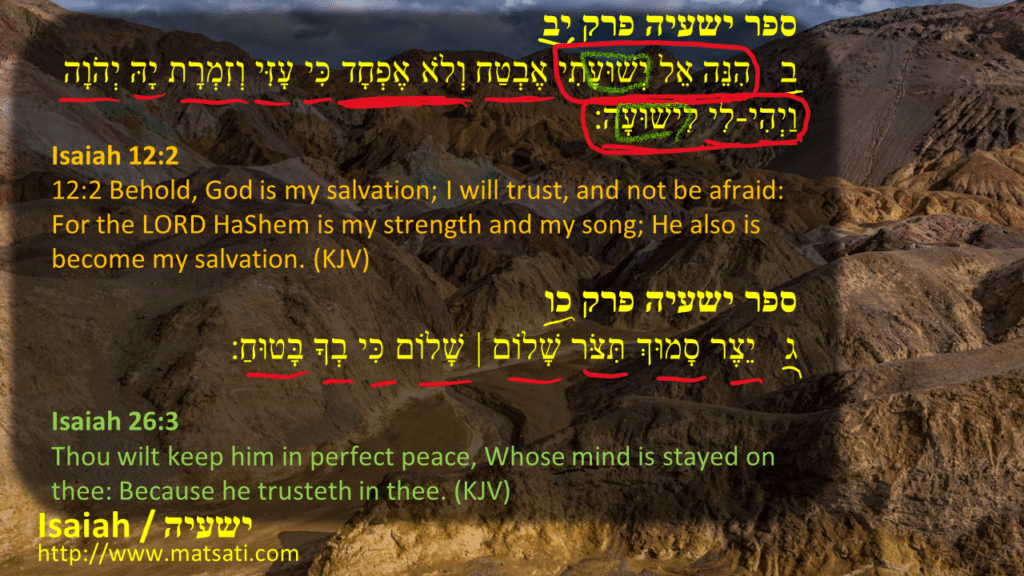
ספר ישעיה פרק יב
ב הִנֵּה אֵל יְשׁוּעָתִי אֶבְטַח וְלֹא אֶפְחָד כִּי עָזִּי וְזִמְרָת יָהּ יְהֹוָה וַיְהִי-לִי לִישׁוּעָה:
Isaiah 12:2
12:2 Behold, God is my salvation; I will trust, and not be afraid: For the LORD HaShem is my strength and my song; He also is become my salvation. (KJV)
ספר ישעיה פרק כו
ג יֵצֶר סָמוּךְ תִּצֹּר שָׁלוֹם | שָׁלוֹם כִּי בְךָ בָּטוּחַ:
Isaiah 26:3
Thou wilt keep him in perfect peace, Whose mind is stayed on thee: Because he trusteth in thee. (KJV)
Note how Isaiah acknowledges that God is His salvation, and how he trusts in Him he is not afraid. When we trust in the Lord, we find strength, because He is dwelling in our midst. He sets our minds free from deception if we are honestly seeking help for this! When we trust in the Lord God, He rescues us from our troubles, not just spiritually, but also physically. We are overcomers because of the presence of God in our lives! How do we become overcomers? By trusting in the Lord and seeking the Lord God in truth and righteousness, through His Holy Word and in its application to our lives. God’s word is true, and in the pages of the Scriptures we have the wisdom of God, and the promises of His love and faithfulness to us! If we regularly meditate upon the truths in the scriptures, we will lean upon the Lord God for help, and not lean upon our own understanding, and in this we will find peace and the joy of the Lord. Something very interesting is what Paul wrote to the Ephesians according to Ephesians 3:18-19.
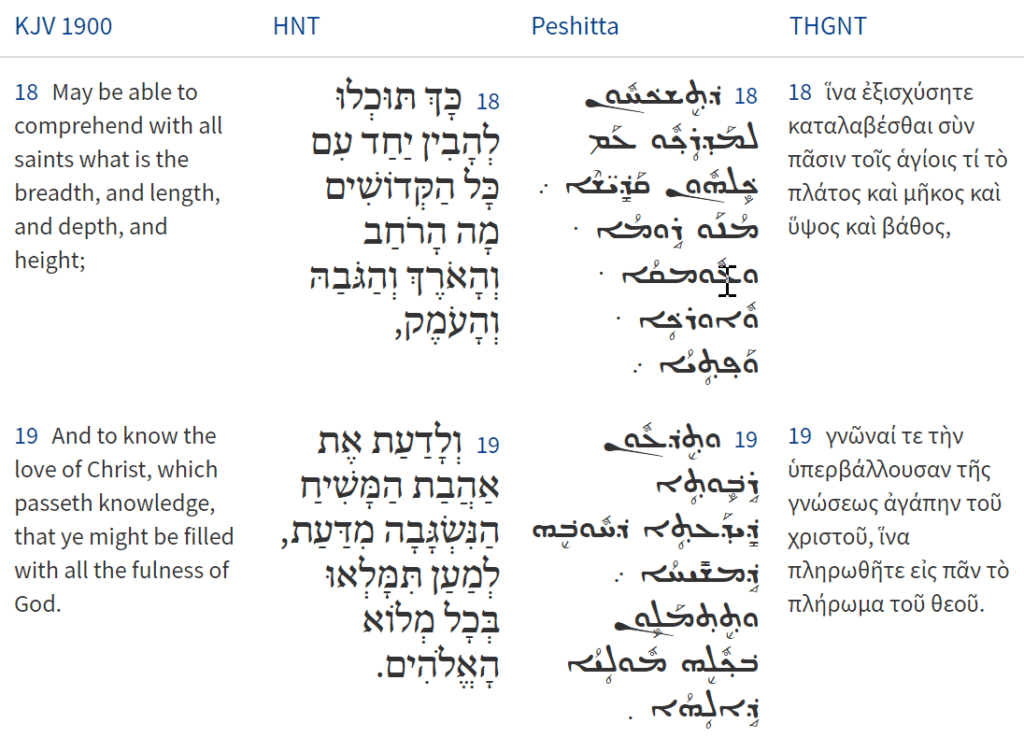
According to the Hebrew NT כָּךְ תּוּכְלוּ לְהָבִין יַחַד עִם כָּל הַקְּדוֹשִׁים “may be able to understand together with all the holy ones…” we note how this statement suggests that we are to learn together from the word of God. This is not about individualism, this is about community, and discussing the scriptures and how to apply God’s word to our lives. The words מָה הָרֹחַב וְהָאֹרֶךְ וְהַגֹּבַהּ וְהָעֹמֶק “what is the breadth, and length, and depth, and height” suggests that it takes some effort to even comprehend how much the Messiah loves us. The reason this is important for us to know, is לְמַעַן תִּמָּלְאוּ בְּכָל מְלוֹא הָאֱלֹהִים “for the reason of being filled with all the fullness of God.” Note how the knowledge of God’s love for us, causes us to be complete in our relationship with him from the sense of being filled with the fullness of God. This agrees with the Greek text ἵνα ⸂πληρωθῆτε εἰς⸃ πᾶν τὸ πλήρωμα τοῦ θεοῦ (NA28) “that you might be filled with the fullness of God.” How this helps us to be filled is to be filled with faith in God and His Messiah, knowing that God’s love for us surpasses all human knowledge. His love is so vast that he must reveal to us the הָרֹחַב וְהָאֹרֶךְ וְהַגֹּבַהּ וְהָעֹמֶק “breadth, length, depth, and height” of Mashiach’s (Messiah, Christ) love, just so we can comprehend it. This elicits unconditional trust in the Lord! It is because of God’s infinite love that we can trust in Him! When we are going through difficult times, it can be difficult to see this love of God, but here is where we need to trust in Him! This means whether there are health problems, financial challenges, peer pressure, doesn’t matter what it is, we can trust the Lord. The point is to keep our eyes upon the Lord God our Father in heaven, and upon His Son Yeshua! What Isaiah is telling us here at the end of Isaiah 24, is that we are to keep our focus, our eyes upon the one who is sovereign, wise, and loving. We do this by seeking Him as opposed to seeking help in ourselves or this world.
It is because the people of the world do not trust in the Lord God in heaven is why Isaiah’s prophetic message is taking place stating the following in Isaiah 24:17-18:
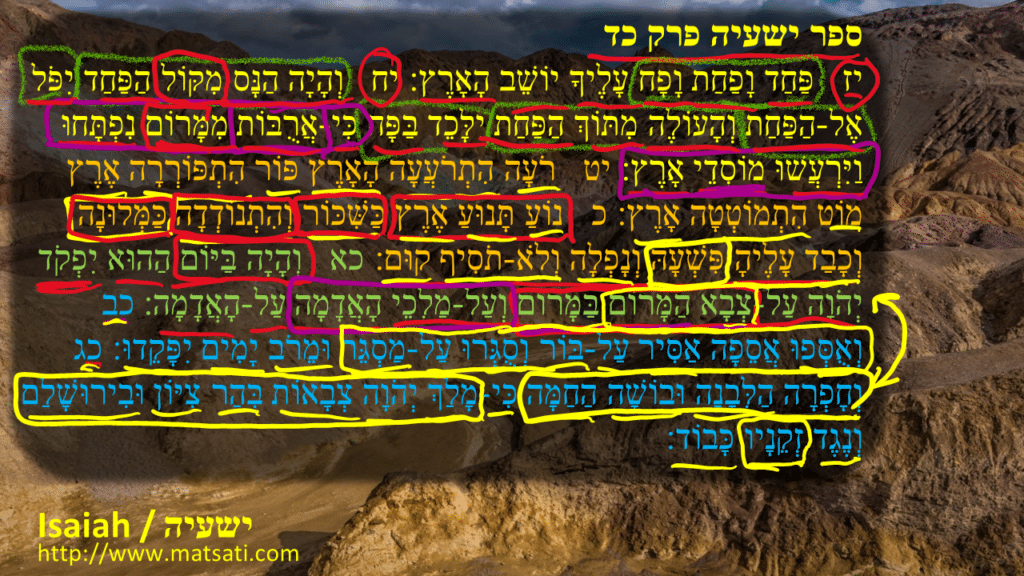
ספר ישעיה פרק כד
יז פַּחַד וָפַחַת וָפָח עָלֶיךָ יוֹשֵׁב הָאָרֶץ: יח וְהָיָה הַנָּס מִקּוֹל הַפַּחַד יִפֹּל אֶל-הַפַּחַת וְהָעוֹלֶה מִתּוֹךְ הַפַּחַת יִלָּכֵד בַּפָּח כִּי-אֲרֻבּוֹת מִמָּרוֹם נִפְתָּחוּ וַיִּרְעֲשׁוּ מוֹסְדֵי אָרֶץ:
Isaiah 24:17 states, “Fear, and the pit, and the snare, are upon thee, O inhabitant of the earth. (פַּחַד וָפַחַת וָפָח עָלֶיךָ יוֹשֵׁב הָאָרֶץ)” Isaiah 24:18 “And it shall come to pass, that he who fleeth from the noise of the fear shall fall into the pit; and he that cometh up out of the midst of the pit shall be taken in the snare: for the windows from on high are open, and the foundations of the earth do shake. (וְהָיָה הַנָּס מִקּוֹל הַפַּחַד יִפֹּל אֶל-הַפַּחַת וְהָעוֹלֶה מִתּוֹךְ הַפַּחַת יִלָּכֵד בַּפָּח כִּי-אֲרֻבּוֹת מִמָּרוֹם נִפְתָּחוּ וַיִּרְעֲשׁוּ מוֹסְדֵי אָרֶץ)” The opening three words to Isaiah 24:17 פַּ֥חַד וָפַ֖חַת וָפָ֑ח should catch the eye, each word begins with the letters פח to emphasize the idea “fear, and the pit, and the snare” which has fallen upon the earth. The word פַחַת can refer to a pit used as a grave (2 Samuel 18:17) or as a pit that traps animals constructed by hunters, and or metaphorically for ruin (Jeremiah 48:43-44, Lamentations 3:47) according to HALOT. The LXX translates פַחַת as βόθυνος “hole, pit.” We note how this Greek word appears in Matthew 12:11, 15:14, and Luke 6:39. In Matthew 12:11 it is in reference to lifting an innocent animal out of a pit on shabbat. In the other two references, the word is used in the sense of the blind leading the blind and falling into the pit. In this case the people are purposefully blind, as we read in Proverbs that such people rely upon their understanding in pride, and so are unable to guide others in truth and righteousness because they themselves fall short of this due to their pride. A text comparison of the LXX, MSS, TgJ, L-Peshitta reveals the following.
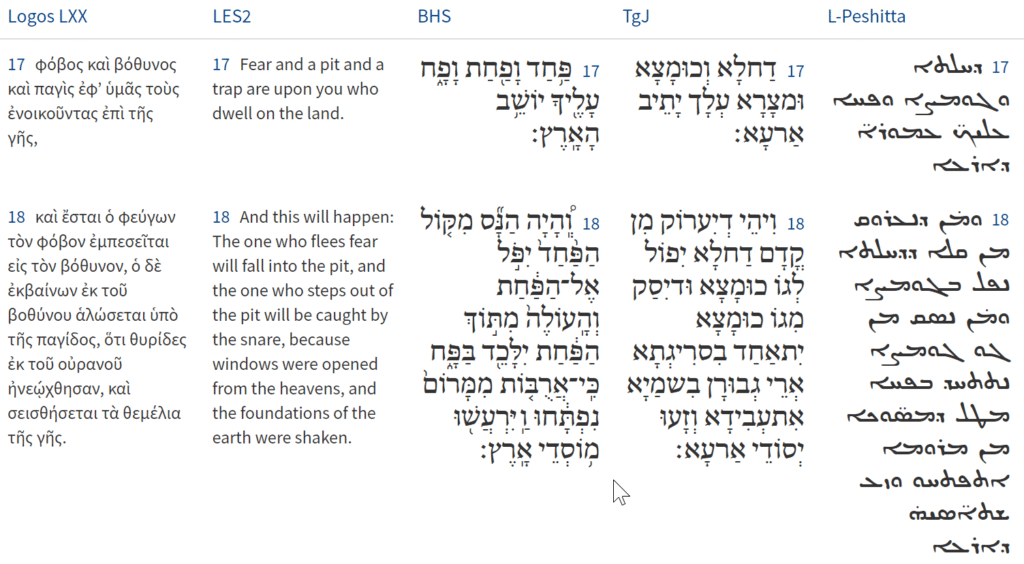
Here the LXX writes καὶ ἔσται ὁ φεύγων τὸν φόβον “and this happens that he who flees fear.” What does it mean to flee fear? Basically, when a person encounters a threat, he or she either resists, retaliates, or simply flees. This is called fight, flight, or freeze. The freeze response is something along the lines of stalling, a temporary pause that gives your mind and body a chance to plan and prepare for your next steps. Here the LXX writes that when one flees fear, they will fall into the pit (βόθυνον). The idea here from the MSS is that one who flees, he falls into a pit, and if he gets out of the pit, he is caught by the snare, and the reason is because the windows of heaven are open and the earth shakes (כִּי-אֲרֻבּוֹת מִמָּרוֹם נִפְתָּחוּ וַיִּרְעֲשׁוּ מוֹסְדֵי אָרֶץ). This suggests that man’s safety is out of his hands in this situation, the trapping comes from above. Paul wrote saying in 2 Thessalonians 2:10-12, 2:10 And with all deceivableness of unrighteousness in them that perish; because they received not the love of the truth, that they might be saved. 2:11 And for this cause God shall send them strong delusion, that they should believe a lie: 2:12 That they all might be damned who believed not the truth but had pleasure in unrighteousness. (KJV) This will befall those who trust in the power of man, the strength of his own arm, or the earth as a place of security. What Isaiah 24:17-18 appears to represent is that life involves a series of traps, and we have to be aware, tuned in the spirit to recognize them when they come. The idea is that we need the Lord God Almighty and His Messiah Yeshua to recognize the pitfalls that comes along and successfully overcome them. For those who do not trust in the Lord, may breathe a short period of relief if overcoming a trap, only to find themselves in a much worse situation because there is no true security outside of the Lord God in heaven who is our refuge and our strength. (Tehillim / Psalms 56:9-12, 91:1-6, Isaiah 33:18 and 54:14) Note the Psalms study that is titled “The Significance of both the Spiritual and the Physical Realms” Here וַיִּרְעֲשׁוּ מוֹסְדֵי אָרֶץ states that the earth is being shaken which represents the fact that the only sure foundation is the Lord. Notice the translation of כִּי-אֲרֻבּוֹת מִמָּרוֹם נִפְתָּחוּ saying “for the windows of the high place are opened” note that the KJV translates the word מִמָּרוֹם as heaven. This word more accurately translated is “from on high” (מִמָּרוֹם) which draws a parallel to the flood of Noah. Could this be a reference to the windows of heaven opened according to Bereshit / Genesis 7:11? In the Genesis account, the text writes וַאֲרֻבֹּ֥ת הַשָּׁמַ֖יִם נִפְתָּֽחוּ literally saying heaven (הַשָּׁמַ֖יִם). The idea is that God causes a significant amount of rain, so much so that it causes a deluge upon the earth which is representative of killing the wicked and cleansing the land of bloodshed. Here when Isaiah writes כִּי-אֲרֻבּוֹת מִמָּרוֹם נִפְתָּחוּ he doesn’t use the word הַשָּׁמַ֖יִם indicating something slightly different from the sense of destruction coming from above, that God is bringing the terror, and it doesn’t matter where one flees, he will be consumed because of his sins!
Isaiah goes on saying the following according to Isaiah 24:19.
ספר ישעיה פרק כד
יט רֹעָה הִתְרֹעֲעָה הָאָרֶץ פּוֹר הִתְפּוֹרְרָה אֶרֶץ מוֹט הִתְמוֹטְטָה אָרֶץ: כ נוֹעַ תָּנוּעַ אֶרֶץ כַּשִּׁכּוֹר וְהִתְנוֹדְדָה כַּמְּלוּנָה וְכָבַד עָלֶיהָ פִּשְׁעָהּ וְנָפְלָה וְלֹא-תֹסִיף קוּם:
Isaiah 24:19 states, “The earth is utterly broken down, the earth is clean dissolved, the earth is moved exceedingly. (רֹעָה הִתְרֹעֲעָה הָאָרֶץ פּוֹר הִתְפּוֹרְרָה אֶרֶץ מוֹט הִתְמוֹטְטָה אָרֶץ)” Isaiah 24:20 “The earth shall reel to and fro like a drunkard, and shall be removed like a cottage; and the transgression thereof shall be heavy upon it; and it shall fall, and not rise again. (נוֹעַ תָּנוּעַ אֶרֶץ כַּשִּׁכּוֹר וְהִתְנוֹדְדָה כַּמְּלוּנָה וְכָבַד עָלֶיהָ פִּשְׁעָהּ וְנָפְלָה וְלֹא-תֹסִיף קוּם)” Verse 19 opens with רֹעָה הִתְרֹעֲעָה הָאָרֶץ the KJV translates this text הִתְרֹעֲעָה which is a Hitpael verb meaning “to be broken” so it is the Lord God who causes the breaking of the earth. The remainder of the sentence can be broken up in this way:
רֹעָה הִתְרֹעֲעָה הָאָרֶץ
פּוֹר הִתְפּוֹרְרָה אֶרֶץ
מוֹט הִתְמוֹטְטָה אָרֶץ
Each clause has an infinitive (פּוֹר and מוֹט) followed by the Hitpael (הִתְפּוֹרְרָה and הִתְמוֹטְטָה). The infinitive provides the future sense, and the Hitpael provides the causative sense. The idea here is that the Lord will cause at a future time, the tossing (פּוֹר) and the tottering (מוֹט) of the earth. We also note that the word מוֹט when spoken, sounds the same as מוֹת meaning “death.” The impact of the Hebrew language here is used to its fullest sense of the future expectation of what is going to happen to the earth, and the Lord God Almighty is the one who is bringing this upon the earth due to the sins of the world. We note the parallel to the book of Revelation.
Revelation 6:12-17
6:12 And I beheld when he had opened the sixth seal, and, lo, there was a great earthquake; and the sun became black as sackcloth of hair, and the moon became as blood; 6:13 And the stars of heaven fell unto the earth, even as a fig tree casteth her untimely figs, when she is shaken of a mighty wind. 6:14 And the heaven departed as a scroll when it is rolled together; and every mountain and island were moved out of their places. 6:15 And the kings of the earth, and the great men, and the rich men, and the chief captains, and the mighty men, and every bondman, and every free man, hid themselves in the dens and in the rocks of the mountains; 6:16 And said to the mountains and rocks, Fall on us, and hide us from the face of him that sitteth on the throne, and from the wrath of the Lamb: 6:17 For the great day of his wrath is come; and who shall be able to stand? (KJV, ܘܰܚܙܺܝܬ݂ ܟܱ݁ܕ݂ ܦ݁ܬ݂ܱܚ ܛܱܒ݂ܥܳܐ ܕܷ݁ܫܬܴ݁ܐ ܆ ܘܢܰܘܕܴ݁ܐ ܪܱܒܴ݁ܐ ܗ̄ܘܳܐ ܂ ܘܫܶܡܫܳܐ ܐܱܝܟ݂ ܣܰܩܳܐ ܕ݁ܣܰܥܪܴܐ ܐܾܘܟܴ݁ܡ ܗܘܳܐ ܂ ܘܣܰܗܪܴܐ ܟܾ݁ܠܷܗ ܗܘܳܐ ܠܷܗ ܐܱܝܟ݂ ܕ݁ܡܳܐ ܂ܘܟ݂ܰܘܟ̈݁ܒ݂ܶܐ ܕܱ݁ܫܡܰܝܳܐ ܢܦ݂ܰܠܘ ܥܰܠ ܐܱܪܥܳܐ ܆ ܐܱܝܟ݂ ܬܻ݁ܬܴ݁ܐ ܕ݁ܫܳܕ݂ܝܳܐ ܦܱ݁ܩܽܘܥܶܝ̈ܗ ܡܶܢ ܪܾܘܚܳܐ ܥܰܫܺܝܢܬܴ݁ܐ ܡܳܐ ܕ݁ܡܶܬ݁ܬ݁ܙܺܝܥܳܐ ܂ ܘܰܫܡܰܝܳܐ ܐܷܬ݂ܦ݁ܪܷܫ ܆ ܘܰܐܝܟ݂ ܟ݁ܬ݂ܴܒ݂ܷ̈ܐ ܐܷܬ݂ܟ݁ܪܷܟ݂ܘ ܂ ܘܟ݂ܽܠ ܛܾܘܪ ܘܟ݂ܽܠ ܓܴ݁ܙܰܪܬܴ݁ܐ ܡܶܢ ܕܾ݁ܘܟܱ݁ܬ݂ܗܽܘܢ ܐܷܬ݁ܬ݁ܙܺܝܥܘ ܂ ܘܡܰܠܟܷ̈݁ܐ ܕܱ݁ܐܪܥܳܐ ܘܪܱ̈ܘܪܒ݂ܳܢܶܐ ܘܪܻ̈ܝܫܰܝ ܐܱܠܦ݂ܷ̈ܐ ܘܥܰܬܻ݁ܝܪܷ̈ܐ ܘܚܰܝ̈ܠܱܘܳܬ݂ܴܐ ܆ ܘܟ݂ܽܠ ܥܰܒ݂̈ܕܷ݁ܐ ܘܰܒ݂ܢܱ̈ܝ ܚܺܐܪܷ̈ܐ ܆ ܛܱܫܺܝܘ ܢܰܦ݂ܫܗܽܘܢ ܒܱ݁ܡܥܰܪܷ̈ܐ ܘܰܒ݂ܫܾ̈ܘܥܶܐ ܕ݁ܛܾܘܪܷ̈ܐ ܂ ܘܳܐܡܪܻܝܢ ܠܛܾܘܪܷ̈ܐ ܘܫܽܘ̈ܥܶܐ ܕ݁ܦ݂ܶܠܘ ܥܠܱܝܢ ܆ ܘܛܱܫܰܘ ܠܱܢ ܡܶܢ ܩܕ݂ܳܡ ܐܱܦܱ݁ܘܗ̄ܝ̈ ܕܷ݁ܐܡܪܴܐ ܂ ܡܶܛܾܠ ܕܷ݁ܐܬ݂ܴܐ ܝܰܘܡܳܐ ܪܱܒܴ݁ܐ ܕ݁ܪܾܘܓ݂ܙܗܽܘܢ ܂ ܘܡܰܢܽܘ ܡܶܫܟܱ݁ܚ ܠܱܡܩܳܡ ܀ 12 Καὶ εἶδον ⸀ὅτε ἤνοιξεν τὴν σφραγῖδα τὴν ἕκτην, καὶ ⸆ σεισμὸς* μέγας ἐγένετο καὶ ὁ ἥλιος ⸉ἐγένετο μέλας⸊ ὡς σάκκος τρίχινος καὶ ἡ σελήνη °ὅλη ἐγένετο ὡς αἷμα 13 καὶ οἱ ἀστέρες τοῦ ⸀οὐρανοῦ ἔπεσαν ⸁εἰς τὴν γῆν, ὡς συκῆ ⸀1βάλλει τοὺς ὀλύνθους αὐτῆς ὑπὸ ⸉ἀνέμου μεγάλου⸊ σειομένη,* 14 καὶ ὁ οὐρανὸς ἀπεχωρίσθη* ὡς βιβλίον ⸀ἑλισσόμενον καὶ πᾶν ὄρος καὶ ⸁νῆσος ἐκ τῶν τόπων αὐτῶν ἐκινήθησαν.* 15 Καὶ οἱ βασιλεῖς τῆς γῆς καὶ οἱ μεγιστᾶνες καὶ οἱ ⸉χιλίαρχοι καὶ οἱ πλούσιοι⸊ καὶ οἱ ἰσχυροὶ καὶ πᾶς δοῦλος καὶ ⸆ ἐλεύθερος* ἔκρυψαν ἑαυτοὺς εἰς τὰ σπήλαια καὶ εἰς τὰς πέτρας* τῶν ὀρέων 16 καὶ λέγουσιν τοῖς ὄρεσιν καὶ ταῖς πέτραις· πέσετε ἐφʼ ἡμᾶς καὶ ⸀κρύψατε ἡμᾶς ἀπὸ προσώπου τοῦ καθημένου ἐπὶ ⸂τοῦ θρόνου⸃ καὶ ἀπὸ τῆς ὀργῆς τοῦ ἀρνίου,* 17 ὅτι ἦλθεν ἡ ἡμέρα ἡ μεγάλη τῆς ὀργῆς ⸀αὐτῶν,* καὶ τίς δύναται σταθῆναι;)
The language in Revelation 6:12-17 indicates how the world has no place before the Lord God Almighty in heaven Creator of all. This imagery that Revelation provides, the mighty men will try to hide themselves but to no avail. Isaiah 24:20 writes נֹ֣ועַ תָּנ֤וּעַ אֶ֨רֶץ֙ כַּשִּׁכֹּ֔ור note the infinitive and Hitpael sequence here (נֹ֣ועַ תָּנ֤וּעַ אֶ֨רֶץ֙) saying that “the earth will quiver/waver” כַּשִּׁכֹּ֔ור “like a drunk.” This provides the idea of a swirling head, the loss of balance due to alcoholic consumption. The text goes on saying וְהִתְנוֹדְדָה כַּמְּלוּנָה וְכָבַד עָלֶיהָ פִּשְׁעָהּ וְנָפְלָה וְלֹא-תֹסִיף קוּם “will wander (Hitpael) like a lodge (of a watchman), and the weight of her sin will be upon her and will fall and not raise up anymore.” So Isaiah provides this imagery of the drunkard (Isaiah 29:9, Tehillim / Psalms 107:27) We note that the lodge of a watchman is a temporary lodging, a hut of some sort that is not meant for a permanent place to live. This almost sounds like homelessness, of a place that can be blown over very easily. The earth wavering in this way appears to cause one to lose all sense of security. One cannot rely upon the earth but must rely upon the Creator God! We note that this is the analogy of one who leans upon another for balance, help, etc. Would it be wise to lean upon a drunken man? This is the imagery that God is providing us in His Holy Word, that the earth is nothing to lean or rely upon, for it too will be destroyed one day!
ספר ישעיה פרק כד
כא וְהָיָה בַּיּוֹם הַהוּא יִפְקֹד יְהֹוָה עַל-צְבָא הַמָּרוֹם בַּמָּרוֹם וְעַל-מַלְכֵי הָאֲדָמָה עַל-הָאֲדָמָה:
Isaiah 24:21 states, “And it shall come to pass on that day, that the LORD shall punish the host of the high ones that are on high, and the kings of the earth upon the earth. (וְהָיָה בַּיּוֹם הַהוּא יִפְקֹד יְהֹוָה עַל-צְבָא הַמָּרוֹם בַּמָּרוֹם וְעַל-מַלְכֵי הָאֲדָמָה עַל-הָאֲדָמָה)” Here in the last days (וְהָיָה בַּיּוֹם) the Isaiah says that the Lord God will punish the host of the high ones that are on high (הַהוּא יִפְקֹד יְהֹוָה עַל-צְבָא הַמָּרוֹם בַּמָּרוֹם) The idea of the “high ones” (הַמָּרוֹם) draws to memory the heights of the mountains as the location of choice where the people of Israel and the nations worshiped demons (idols). The question is who are these “hosts of the high that are on high?” (צְבָא הַמָּרוֹם בַּמָּרוֹם) The reason this is a good question since the following statement addresses the kings of the earth, Isaiah is speaking of something other than man. Midrash Tanchuma Mishpatim 18:10 has the following interpretation on this verse.
Midrash Tanchuma Mishpatim 18:10
וְכֵן הוּא עוֹשֶׂה לֶעָתִיד, נִפְרָע מִן הַשָּׂרִים שֶׁל אֻמּוֹת הָעוֹלָם תְּחִלָּה, וְאַחַר כָּךְ עַל מַלְכֵי הָאֻמּוֹת, שֶׁנֶּאֱמַר: וְהָיָה בַּיּוֹם הַהוּא יִפְקֹד ה’ עַל צְבָא הַמָּרוֹם וְעַל מַלְכֵי הָאֲדָמָה עַל הָאֲדָמָה (ישעיה כד, כא). אָמַר לָהֶם הַקָּדוֹשׁ בָּרוּךְ הוּא לְיִשְׂרָאֵל: בָּעוֹלָם הַזֶּה, מַלְאָךְ הָיִיתִי מְשַׁלֵּחַ לְהַבְרִיחַ מִפְּנֵיכֶם אֻמּוֹת הָעוֹלָם. אֲבָל לֶעָתִיד, אֲנִי מַנְהִיג אֶתְכֶם וְאֵלִיָּהוּ אֲנִי מְשַׁלֵחַ לִפְנֵיכֶם, שֶׁנֶּאֱמַר: הִנֵּה אָנֹכִי שֹׁלֵחַ לָכֶם אֵת אֵלִיָּה הַנָּבִיא לִפְנֵי בּוֹא יוֹם ה’ הַגָּדוֹל וְהַנּוֹרָא (מלאכי ג, כג).
And so He would do in the future, He would punish their guardian angels and then the kings of the nations, as it is said: And it shall come to pass in that day, that the Lord will punish the host of the high heaven on high, and the kings of the earth upon the earth (Isa. 24:21). The Holy One, blessed be He, said to Israel: In this world I will send an angel to make the peoples of the world flee from you, but in the future I will lead you and I will send Elijah before you, as it is said: Behold, I will send you Elijah the prophet before the coming of the great and terrible day of the Lord (Mal. 3:24).
This is an interesting interpretation as these guardian angels are said in other locations in the rabbinic literature to cause their people to sin in idolatry, to fight against Israel and against the God in heaven. These may be part of the ⅓ of the host of heaven that fell in rebellion against the lordship of God and have been regionally distributed around the world to deceive the nations. This reminds us that we are in a spiritual battle here on earth, and so we should always be in the Word of God, seeking the face of God, and living in repentance and truth, along with always being motivated to live our lives according to God’s holy Word because of our love for God. (Devarim / Deuteronomy 6:4-5) This verse also reveals to us how the righteous will be rewarded, and the wicked punished follows through even to the spiritual realm. We note that Scripture also describes the “host of heaven” (צְבָא הַמָּרוֹם) as being both the stars and the pagan pantheon since the false gods were frequently identified with the stars. (Devarim / Deuteronomy 17:3, 1 Kings 17:16, Jeremiah 8:2, 2 Chronicles 33:1-8) We note that this interpretation Is consistent throughout the whole of the Tanakh, it is not simply a later OT and intertestamental period interpretation, evidence is provided in the Torah according to Devarim / Deuteronomy 17:3 on the early understanding of these things.
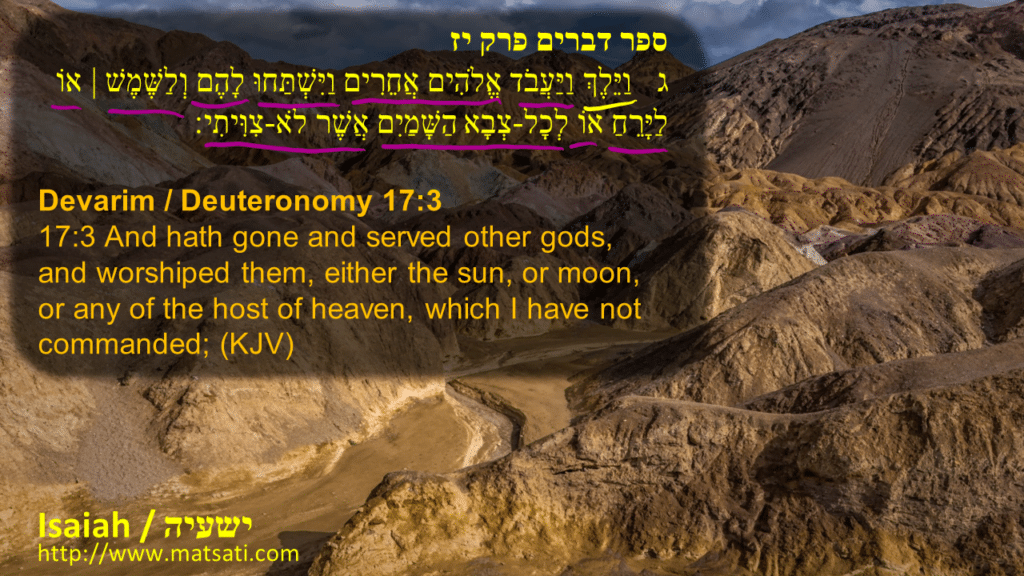
ספר דברים פרק יז
ג וַיֵּלֶךְ וַיַּעֲבֹד אֱלֹהִים אֲחֵרִים וַיִּשְׁתַּחוּ לָהֶם וְלַשֶּׁמֶשׁ | אוֹ לַיָּרֵחַ אוֹ לְכָל-צְבָא הַשָּׁמַיִם אֲשֶׁר לֹא-צִוִּיתִי:
Devarim / Deuteronomy 17:3
17:3 And hath gone and served other gods, and worshiped them, either the sun, or moon, or any of the host of heaven, which I have not commanded; (KJV)
We note the interpretation in Christian commentaries states that the pantheon and host of heaven was integrated into Hebrew thought as a later phenomenon. This is not true since there was a pantheon of gods even in the ancient Canaanite religion of Ugarit as well. The Torah describes the host of heaven ascribing this to idolatry and false gods as a very early understanding. Here these spiritual powers, the heavenly host, were understood to be the patrons of nations (guardian angels) in the rabbinic literature, and these angels were rebellious angels who came to confront Israel and God in heaven. The use of the phrase עַל-צְבָא הַמָּרוֹם בַּמָּרוֹם “upon the host the high ones on high” represents how God is actually superior and above all who raise themselves up against Him. Regardless of whether this is a star in heaven or a king on the earth (see Isaiah 34:4-5). The imagery that Isaiah uses here is to demonstrate that the God of Israel is Lord over all, and even over the nations and their gods, even if they appear to be strong and irresistible, we can trust in God and in His Messiah!
Isaiah concludes chapter 24 saying the following according to Isaiah 24:22-23.
ספר ישעיה פרק כד
כב וְאֻסְּפוּ אֲסֵפָה אַסִּיר עַל-בּוֹר וְסֻגְּרוּ עַל-מַסְגֵּר וּמֵרֹב יָמִים יִפָּקֵדוּ: כג וְחָפְרָה הַלְּבָנָה וּבוֹשָׁה הַחַמָּה כִּי-מָלַךְ יְהֹוָה צְבָאוֹת בְּהַר צִיּוֹן וּבִירוּשָׁלַם וְנֶגֶד זְקֵנָיו כָּבוֹד:
Isaiah 24:22 states, “And they shall be gathered together, as prisoners are gathered in the pit, and shall be shut up in the prison, and after many days shall they be visited. (וְאֻסְּפוּ אֲסֵפָה אַסִּיר עַל-בּוֹר וְסֻגְּרוּ עַל-מַסְגֵּר וּמֵרֹב יָמִים יִפָּקֵדוּ)” Isaiah 24:23 “Then the moon shall be confounded, and the sun ashamed, when the LORD of hosts shall reign in mount Zion, and in Jerusalem, and before his ancients gloriously. (וְחָפְרָה הַלְּבָנָה וּבוֹשָׁה הַחַמָּה כִּי-מָלַךְ יְהֹוָה צְבָאוֹת בְּהַר צִיּוֹן וּבִירוּשָׁלַם וְנֶגֶד זְקֵנָיו כָּבוֹד)” Notice here וְחָפְרָה הַלְּבָנָה וּבוֹשָׁה הַחַמָּה the shame of the sun and moon, this parallels the host in heaven, or the spiritual forces that are at work, the Lord is sovereign and will show them for who they are, wicked, evil, deceivers, etc. Here we are given the final outcome of both the spiritual and physical worlds. The description וְאֻסְּפ֨וּ אֲסֵפָ֤ה אַסִּיר֙ עַל־בֹּ֔ור וְסֻגְּר֖וּ עַל־מַסְגֵּ֑ר if we consider the parallel to the host of heaven, these evil spirits on high that deceive, this is very reminiscent of 2 Peter 2:4, Rev. 9:2-3, 9:11, 11:7, and 17:8.
2 Peter 2:4
2:4 For if God spared not the angels that sinned, but cast them down to hell, and delivered them into chains of darkness, to be reserved unto judgment; (KJV, ܐܷܢ ܓܷ݁ܝܪ ܐܱܠܴܗܳܐ ܥܰܠ ܡܰܠܱܐܟ݂ܷ̈ܐ ܕܱ݁ܚܛܱܘ ܠܴܐ ܚܳܣ ܇ ܐܷܠܴܐ ܒ݁ܫܺܫ̈ܠܴܬ݂ܴܐ ܕ݁ܥܰܡܛܴܢܳܐ ܥܰܓܷ݁ܢ ܐܷܢܽܘܢ ܒ݁ܬ݂ܱܚܬܴ݁ܝܴ̈ܬ݂ܴܐ ܇ ܘܰܐܫܠܷܡ ܐܷܢܽܘܢ ܕ݁ܢܶܬ݂ܢܰܛܪܾܘܢ ܠܕ݂ܺܝܢܳܐ ܕ݁ܫܽܘܢܳܩܳܐ ܆ 4 Εἰ γὰρ ὁ θεὸς ἀγγέλων ἁμαρτησάντων οὐκ ἐφείσατο* ἀλλὰ ⸀σειραῖς ζόφου ταρταρώσας παρέδωκεν εἰς κρίσιν* ⸁τηρουμένους)
Revelation 9:2-3
2:2 And he opened the bottomless pit; and there arose a smoke out of the pit, as the smoke of a great furnace; and the sun and the air were darkened by reason of the smoke of the pit. 2:3 And there came out of the smoke locusts upon the earth: and unto them was given power, as the scorpions of the earth have power. (KJV, ܘܰܣܠܷܩ ܬ݁ܢܳܢܳܐ ܡܶܢ ܒܻ݁ܐܪܷ̈ܐ ܆ ܐܱܝܟ݂ ܬ݁ܢܳܢܳܐ ܕܱ݁ܐܬܾ݁ܘܢܳܐ ܪܱܒܴ݁ܐ ܕ݁ܡܶܫܬ݁ܓ݂ܰܪ ܂ ܘܰܚܫܶܟ݂ ܫܶܡܫܳܐ ܘܳܐܐܱܪ ܡܶܢ ܬ݁ܢܳܢܳܐ ܕ݁ܒ݂ܺܐܪܷ̈ܐ ܂ܘܡܶܢ ܬ݁ܢܳܢܳܐ ܢܦ݂ܰܩܘ ܩܰܡ̈ܨܷܐ ܥܰܠ ܐܱܪܥܳܐ ܆ ܘܶܐܬ݂ܻܝܗܶܒ݂ ܠܗܽܘܢ ܫܽܘܠܛܴܢܳܐ ܕܻ݁ܐܝܬ݂ ܠܥܶܩܰܪ̈ܒ݂ܶܐ ܕܱ݁ܐܪܥܳܐ ܂ 2 ⸋καὶ ἤνοιξεν τὸ φρέαρ τῆς ἀβύσσου,⸌* καὶ ἀνέβη °καπνὸς ἐκ τοῦ φρέατος ὡς καπνὸς καμίνου ⸀μεγάλης,* καὶ ⸁ἐσκοτώθη ὁ ἥλιος καὶ ὁ ἀὴρ ἐκ τοῦ καπνοῦ ⸆ τοῦ φρέατος. 3 καὶ ἐκ τοῦ καπνοῦ ἐξῆλθον ἀκρίδες εἰς τὴν γῆν,* καὶ ἐδόθη ⸀αὐταῖς ἐξουσία ὡς ἔχουσιν ἐξουσίαν οἱ σκορπίοι τῆς γῆς.)
Revelation 9:11
9:11 And they had a king over them, which is the angel of the bottomless pit, whose name in the Hebrew tongue is Abaddon, but in the Greek tongue hath his name Apollyon. (KJV, ܘܺܐܝܬ݂ ܗ̄ܘܳܐ ܠܗܽܘܢ ܫܶܪܝܳܢܳܐ ܐܱܝܟ݂ ܫܶܪܝܳܢܳܐ ܕ݁ܦ݂ܰܪܙܠܴܐ ܂ ܘܩܳܠܴܐ ܕ݁ܓ݂ܶܦܱ݁ܝ̈ܗܽܘܢ ܐܱܝܟ݂ ܩܳܠܴܐ ܕ݁ܡܰܪ̈ܟ݁ܒ݂ܳܬ݂ܴܐ ܕ݁ܪܱ̈ܟ݂ܫܳܐ ܣܰܓܻ݁ܝܷ̈ܐܐ ܕ݁ܪܴܗܛܻܝܢ ܠܱܩܪܴܒ݂ܳܐ ܂ 9 καὶ εἶχον θώρακας ⸋ὡς θώρακας⸌ σιδηροῦς, καὶ ἡ φωνὴ τῶν πτερύγων αὐτῶν ὡς φωνὴ ἁρμάτων ἵππων πολλῶν τρεχόντων εἰς πόλεμον,)
Revelation 11:7
11:7 And when they shall have finished their testimony, the beast that ascendeth out of the bottomless pit shall make war against them, and shall overcome them, and kill them. (KJV, ܘܡܳܐ ܕ݁ܫܰܡܠܻܝܘ ܣܳܗܕܾ݁ܘܬ݂ܗܽܘܢ ܆ ܚܰܝܽܘܬ݂ܴܐ ܕ݁ܣܳܠܩܳܐ ܡܶܢ ܝܰܡܳܐ ܬܷ݁ܥܒܷ݁ܕ݂ ܥܰܡܗܽܘܢ ܩܪܴܒ݂ܳܐ ܂ ܘܬ݂ܷܙܟܷ݁ܐ ܐܷܢܽܘܢ ܘܬ݂ܷܩܛܾܘܠ ܐܷܢܽܘܢ ܂ 7 Καὶ ὅταν τελέσωσιν τὴν μαρτυρίαν αὐτῶν, ⸂τὸ θηρίον τὸ⸃ ἀναβαῖνον ἐκ τῆς ἀβύσσου ποιήσει ⸉μετʼ αὐτῶν πόλεμον⸊ καὶ νικήσει αὐτοὺς ⸋καὶ ἀποκτενεῖ αὐτούς⸌.)
Revelation 17:8
17:8 The beast that thou sawest was, and is not; and shall ascend out of the bottomless pit, and go into perdition: and they that dwell on the earth shall wonder, whose names were not written in the book of life from the foundation of the world, when they behold the beast that was, and is not, and yet is. (KJV, ܚܰܝܽܘܬ݂ܴܐ ܕܱ݁ܚܙܰܝܬ݁ ܐܻܝܬ݂ܷܝܗ ܗ̄ܘܳܬ݂ ܘܠܱܝܬܷ݁ܝܗ ܂ ܥܬ݂ܻܝܕ݂ܳܐ ܕ݁ܬ݂ܷܣܰܩ ܡܶܢ ܝܰܡܳܐ ܘܠܱܐܒ݂ܕܴ݁ܢܳܐ ܐܴܙܳܠ̱ܐ ܂ ܘܢܶܬ݁ܕܱ݁ܡܪܾܘܢ ܥܳܡܪܱ̈ܝ ܥܰܠ ܐܱܪܥܳܐ ܇ ܗܳܢܽܘܢ ܕ݁ܠܴܐ ܟ݁ܬ݂ܻܝܒ݂ܺܝܢ ܫܡܳܗܰܝ̈ܗܽܘܢ ܒ݁ܣܶܦ݂ܪܴܐ ܕ݁ܚܰܝܷ̈ܐ ܂ ܡܶܢ ܬܱ݁ܪ̈ܡܝܳܬ݂ܷܗ ܕ݁ܥܳܠܡܳܐ ܇ ܕ݁ܚܳܙܶܝܢ ܚܰܝܽܘܬ݂ܴܐ ܕܻ݁ܐܝܬ݂ܷܝܗ ܗ̄ܘܳܬ݂ ܘܠܱܝܬܷ݁ܝܗ ܂ ܘܩܶܪܒܱ݁ܬ݂ ܂ 8 Τὸ θηρίον ὃ εἶδες ἦν καὶ οὐκ ἔστιν καὶ μέλλει ἀναβαίνειν ἐκ τῆς ἀβύσσου καὶ εἰς ἀπώλειαν ⸀ὑπάγει,* καὶ ⸁θαυμασθήσονται οἱ κατοικοῦντες ⸂ἐπὶ τῆς γῆς⸃,* ὧν οὐ γέγραπται ⸄τὸ ὄνομα⸅ ⸂1ἐπὶ τὸ βιβλίον⸃ τῆς ζωῆς ἀπὸ καταβολῆς κόσμου,* βλεπόντων τὸ θηρίον ὅτι ἦν καὶ οὐκ ἔστιν ⸂2καὶ παρέσται⸃.*)
According to 2 Peter 2:4, Peter speaks to the rebellious angels as being bound and held in darkness and chains until a specified period of time. This period of time until their release is spoken of according to the book of Revelation. We note that according to Revelation 9:11 speaks of a chief angel that is over the demonic locust that comes from the pit, this suggests that these locusts are spiritual in nature. This is an important observation, coupled with what King Solomon wrote according to Mishley / Proverbs 30:27.
ספר משלי פרק ל
כז מֶ֭לֶךְ אֵ֣ין לָאַרְבֶּ֑ה וַיֵּצֵ֖א חֹצֵ֣ץ כֻּלֹּֽו׃
Mishley / Proverbs 30:27
30:27 locusts have no king, yet they advance together in ranks; (NIV)
So here Solomon writes about locusts on earth, how they behave, they have no king but appear to move as a swarm together wreaking devastation to the plant life of the region they are moving through. In the case of Revelation 9:11, these locusts that come out of the pit have a king over them, a demonic-angelic spirit whose name is Abadon or Apollyon. So, by reason that they come from the pit, which is a place reserved for fallen angels, suggests that these are spiritual in nature. The idea of the pit also seems to closely parallel east we are reading here in Isaiah 24:17-23. They also do not function in the same manner as locusts here on earth since Revelation 9 states that they will not harm the foliage but will harm men. The Isaiah text states, וְאֻסְּפוּ אֲסֵפָה אַסִּיר עַל-בּוֹר וְסֻגְּרוּ עַל-מַסְגֵּר וּמֵרֹב יָמִים יִפָּקֵדוּ “And they shall be gathered together, as prisoners are gathered in the pit, and shall be shut up in the prison, and after many days shall they be visited.” This sounds a lot like their being bound for a period of time, and then they will be released for a period of time. Isaiah says these spiritual beings are gathered and placed in the pit (בּוֹר) and the dungeon (מַסְגֵּר). Based upon the book of Revelation, the bottomless pit appears to be a temporary imprisonment until the final judgment is given by God.
Isaiah 24:23 states, וְחָפְרָה הַלְּבָנָה וּבוֹשָׁה הַחַמָּה כִּי-מָלַךְ יְהֹוָה צְבָאוֹת בְּהַר צִיּוֹן וּבִירוּשָׁלַם וְנֶגֶד זְקֵנָיו כָּבוֹד “Then the moon shall be confounded, and the sun ashamed, when the LORD of hosts shall reign in mount Zion, and in Jerusalem, and before his ancients gloriously.” This draws us back to the idea in the phrase עַל-צְבָא הַמָּרוֹם בַּמָּרוֹם “upon the host the high ones on high” as referencing the stars. We note that Baal is the sun god. Isalm worships a moon god (Allah). Isaiah says these false gods will hang their heads in shame (Isaiah 60:19, Joel 3:15, Zechariah 14:7, Revelation 21:23 and 22:5). We note again that the sun and the moon were important deities in the ancient Near East. Nothing can stand alongside God in heaven, which is the major reason why Isaiah emphasizes the Lordship of God according to Isaiah 30:33, 32:1, 33:17, 33:22, 41:21, 43:15, 44:6, and 52:7. The last half of Isaiah 24:23 states that the Lord will reign in Zion, in Jerusalem, and before this ancients (זְקֵנָיו). We note how Revelation compliments these verses, for example in Revelation 4:4 and 4:9-11 the ancient peoples bow down, the elders cast their crowns before God, and give Him the glory, the honor, and the praise forever and ever. We note the importance of the Messiah Yeshua, as we read in Revelation chapter 4 and 5 of the Lord God and the Lamb of God working together for the salvation of the people. The creator God is our redeemer, and his Lordship, and His Kingship are eternal, and the Lamb of God, His kingdom is established by God our Father in heaven, and this leads us to the importance of Isaiah 53, the suffering servant, and the savior king! What we take away from Isaiah 24:17-23 and studying these things is that we are reminded to seek the Lord in His Word, in prayer, and in the way we live our lives (bringing glory to God). Because only then will the Lord work in the life of the faithful to turn away from the deception and the lies of this world!
Rabbinic Commentary
The Targum Jonathan is an Aramaic and Rabbinic translation of the book of Isaiah and is therefore a valuable resource for the study of the book of Isaiah.
תרגום יונתן בן עוזיאל אל ישעיה פרק כד:יז-כג
יז דַחלָא וְכוּמָצָא וּמצָרָא עְלָך יָתֵיב אַרעָא׃ יח וִיהֵי דְיִערֹוק מִן קֳדָם דַחלָא יִפֹול לְגֹו כוּמָצָא וּדיִסַק מִגֹו כוּמָצָא יִתאַחַד בִסרִיגְתָא אְרֵי גְבוּרָן בִשמַיָא אִתעְבִידָא וְזָעוּ יְסֹודֵי אַרעָא׃ יט מְזָע תְזוּעַ אַרעָא מְנָד תְנוּד אַרעָא פֵירוּק תִתפְרֵיק אַרעָא׃ כ אִשתְדַאָה תִשתְדֵי אַרעָא כְרָויָא וּתהֵי אָזְלָא וְאַתיַא כְעַרזְלָא וְיִתקְפוּן עְלַה חֹובַה וְתִיפֹול וְלָא תֹוסִיף לִמקָם׃ כא וִיהֵי בְעִידָנָא הַהוּא יַסעַר יוי עַל חֵילָוָת תוּקפָא דְיָתְבִין בְתוּקפָא וְעַל מַלכֵי בְנֵי אְנָשָא דְדָיְרִין עַל אַרעָא׃ כב וְיִכנְשוּנוּנוּן מִכנָש לְבֵית אְסִירֵי וִיגוּנוּנוּן לְבֵית עְגָנָא וּמִסְגֵי יֹומִין יֵיעֹול דֻכרָנְהֹון׃ כג וְיִבַהתוּן דְפָלְחִין לְסֵיהְרָא וְיִתכַנעוּן דְסָגְדִין לְשִמשָא אְרֵי תִתגְלֵי מַלכוּתָא דַיוי צְבָאֹות בְטוּרָא דְצִיֹון וּבִירוּשלַם וּקֳדָם סָבֵי עַמֵיה בִיקָר׃
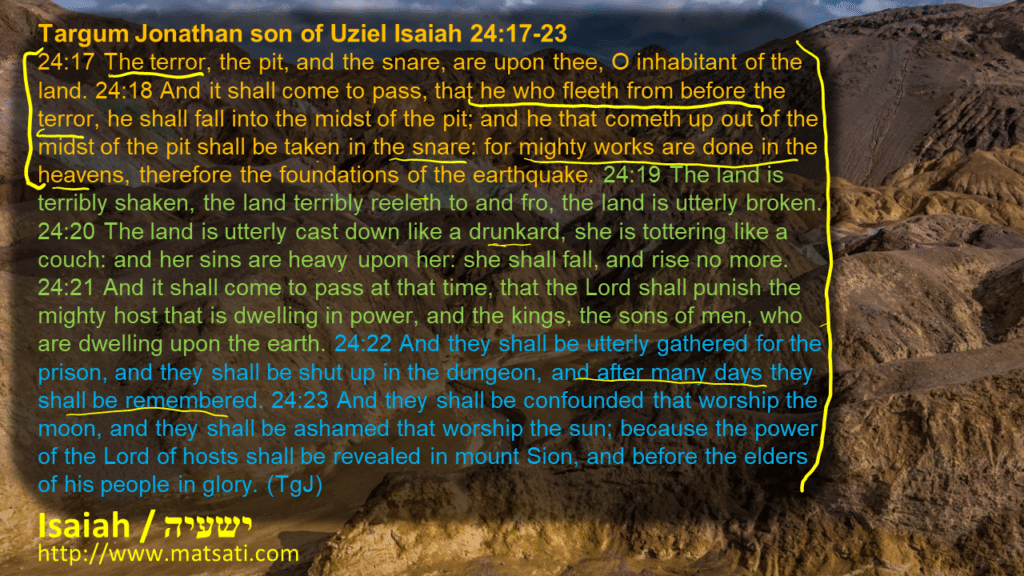
Targum Jonathan son of Uziel Isaiah 24:17-23
24:17 The terror, the pit, and the snare, are upon thee, O inhabitant of the land. 24:18 And it shall come to pass, that he who fleeth from before the terror, he shall fall into the midst of the pit; and he that cometh up out of the midst of the pit shall be taken in the snare: for mighty works are done in the heavens, therefore the foundations of the earth quake. 24:19 The land is terribly shaken, the land terribly reeleth to and fro, the land is utterly broken. 24:20 The land is utterly cast down like a drunkard, she is tottering like a couch: and her sins are heavy upon her: she shall fall, and rise no more. 24:21 And it shall come to pass at that time, that the Lord shall punish the mighty host that is dwelling in power, and the kings, the sons of men, who are dwelling upon the earth. 24:22 And they shall be utterly gathered for the prison, and they shall be shut up in the dungeon, and after many days they shall be remembered. 24:23 And they shall be confounded that worship the moon, and they shall be ashamed that worship the sun; because the power of the Lord of hosts shall be revealed in mount Sion, and before the elders of his people in glory. (TgJ)
When comparing the MSS with the TgJ, the TgJ appears to place a lower emphasis upon the spiritual aspect of the “host of heaven” (צְבָא הַמָּרוֹם). Targum Jonathan (תרגום יונתן בן עוזיאל), otherwise referred to as Targum Yonasan/Yonatan, is the official eastern (Babylonian) targum (Aramaic translation) to the Nevi’im (“prophets”). The Targum Jonathan is a major source for the history of biblical interpretation, because it often inserts paraphrastic explanations, which sometimes go back on very old exegetical traditions found in no other rabbinical work, and which in other cases constitute their earliest attestation. Here the TgJ speaks to terror causing one to flee. The translator of the prophets (TgJ) chose to focus more on the land of Israel and those who have turned from the paths of righteousness. The outcome of those who turn from the Torah of God, the Torah describes the situation, that sudden fear will overtake such persons, and they will have no security in the land, and flee from their enemies. This is the description given according to Isaiah 24:17-18 which state, יז דַחלָא וְכוּמָצָא וּמצָרָא עְלָך יָתֵיב אַרעָא׃ 24:17 The terror, the pit, and the snare, are upon thee, O inhabitant of the land. יח וִיהֵי דְיִערֹוק מִן קֳדָם דַחלָא יִפֹול לְגֹו כוּמָצָא וּדיִסַק מִגֹו כוּמָצָא יִתאַחַד בִסרִיגְתָא אְרֵי גְבוּרָן בִשמַיָא אִתעְבִידָא וְזָעוּ יְסֹודֵי אַרעָא׃ 24:18 And it shall come to pass, that he who fleeth from before the terror, he shall fall into the midst of the pit; and he that cometh up out of the midst of the pit shall be taken in the snare: for mighty works are done in the heavens, therefore the foundations of the earthquake. (TgJ) This is exactly how the Torah describes one who has no concern for the holy ways of God according to Devarim / Deuteronomy 28:15-26.
ספר דברים פרק כח
טו וְהָיָה אִם-לֹא תִשְׁמַע בְּקוֹל יְהוָֹה אֱלֹהֶיךָ לִשְׁמֹר לַעֲשֹוֹת אֶת-כָּל-מִצְוֹתָיו וְחֻקֹּתָיו אֲשֶׁר אָנֹכִי מְצַוְּךָ הַיּוֹם וּבָאוּ עָלֶיךָ כָּל-הַקְּלָלוֹת הָאֵלֶּה וְהִשִּׂיגוּךָ: טז אָרוּר אַתָּה בָּעִיר וְאָרוּר אַתָּה בַּשָּׂדֶה: יז אָרוּר טַנְאֲךָ וּמִשְׁאַרְתֶּךָ: יח אָרוּר פְּרִי-בִטְנְךָ וּפְרִי אַדְמָתֶךָ שְׁגַר אֲלָפֶיךָ וְעַשְׁתְּרֹת צֹאנֶךָ: יט אָרוּר אַתָּה בְּבֹאֶךָ וְאָרוּר אַתָּה בְּצֵאתֶךָ: כ יְשַׁלַּח יְהוָֹה | בְּךָ אֶת-הַמְּאֵרָה אֶת-הַמְּהוּמָה וְאֶת-הַמִּגְעֶרֶת בְּכָל-מִשְׁלַח יָדְךָ אֲשֶׁר תַּעֲשֶֹה עַד הִשָּׁמֶדְךָ וְעַד-אֲבָדְךָ מַהֵר מִפְּנֵי רֹעַ מַעֲלָלֶיךָ אֲשֶׁר עֲזַבְתָּנִי: כא יַדְבֵּק יְהוָֹה בְּךָ אֶת-הַדָּבֶר עַד כַּלֹּתוֹ אֹתְךָ מֵעַל הָאֲדָמָה אֲשֶׁר-אַתָּה בָא-שָׁמָּה לְרִשְׁתָּהּ: כב יַכְּכָה יְהֹוָה בַּשַּׁחֶפֶת וּבַקַּדַּחַת וּבַדַּלֶּקֶת וּבַחַרְחֻר וּבַחֶרֶב וּבַשִּׁדָּפוֹן וּבַיֵּרָקוֹן וּרְדָפוּךָ עַד אָבְדֶךָ: כג וְהָיוּ שָׁמֶיךָ אֲשֶׁר עַל-רֹאשְׁךָ נְחשֶׁת וְהָאָרֶץ אֲשֶׁר-תַּחְתֶּיךָ בַּרְזֶל: כד יִתֵּן יְהוָֹה אֶת-מְטַר אַרְצְךָ אָבָק וְעָפָר מִן-הַשָּׁמַיִם יֵרֵד עָלֶיךָ עַד הִשָּׁמְדָךְ: כה יִתֶּנְךָ יְהֹוָה | נִגָּף לִפְנֵי אֹיְבֶיךָ בְּדֶרֶךְ אֶחָד תֵּצֵא אֵלָיו וּבְשִׁבְעָה דְרָכִים תָּנוּס לְפָנָיו וְהָיִיתָ לְזַעֲוָה לְכֹל מַמְלְכוֹת הָאָרֶץ: כו וְהָיְתָה נִבְלָתְךָ לְמַאֲכָל לְכָל-עוֹף הַשָּׁמַיִם וּלְבֶהֱמַת הָאָרֶץ וְאֵין מַחֲרִיד:
Devarim / Deuteronomy 28:15-26
28:15 But it shall come to pass, if thou wilt not hearken unto the voice of the LORD thy God, to observe to do all his commandments and his statutes which I command thee this day; that all these curses shall come upon thee, and overtake thee: 28:16 Cursed shalt thou be in the city, and cursed shalt thou be in the field. 28:17 Cursed shall be thy basket and thy store. 28:18 Cursed shall be the fruit of thy body, and the fruit of thy land, the increase of thy kine, and the flocks of thy sheep. 28:19 Cursed shalt thou be when thou comest in, and cursed shalt thou be when thou goest out. 28:20 The LORD shall send upon thee cursing, vexation, and rebuke, in all that thou settest thine hand unto for to do, until thou be destroyed, and until thou perish quickly; because of the wickedness of thy doings, whereby thou hast forsaken me. 28:21 The LORD shall make the pestilence cleave unto thee, until he have consumed thee from off the land, whither thou goest to possess it. 28:22 The LORD shall smite thee with a consumption, and with a fever, and with an inflammation, and with an extreme burning, and with the sword, and with blasting, and with mildew; and they shall pursue thee until thou perish. 28:23 And thy heaven that is over thy head shall be brass, and the earth that is under thee shall be iron. 28:24 The LORD shall make the rain of thy land powder and dust: from heaven shall it come down upon thee, until thou be destroyed. 28:25 The LORD shall cause thee to be smitten before thine enemies: thou shalt go out one way against them, and flee seven ways before them: and shalt be removed into all the kingdoms of the earth. 28:26 And thy carcase shall be meat unto all fowls of the air, and unto the beasts of the earth, and no man shall fray them away. (KJV)
The key passage is verse 15, וְהָיָה אִם-לֹא תִשְׁמַע בְּקוֹל יְהוָֹה אֱלֹהֶיךָ “and it will come to pass if you will not listen to the voice of the Lord your God.” Note how the voice of God comes from the pages of the ancient Scriptures! The Torah speaks of one bringing a curse upon oneself through the rejection of God’s Holy word. This led to verse 25, כה יִתֶּנְךָ יְהֹוָה | נִגָּף לִפְנֵי אֹיְבֶיךָ בְּדֶרֶךְ אֶחָד תֵּצֵא אֵלָיו וּבְשִׁבְעָה דְרָכִים תָּנוּס לְפָנָיו וְהָיִיתָ לְזַעֲוָה לְכֹל מַמְלְכוֹת הָאָרֶץ 28:25 The LORD shall cause thee to be smitten before thine enemies: thou shalt go out one way against them, and flee seven ways before them: and shalt be removed into all the kingdoms of the earth. (KJV) This parallels what we read according to Isaiah 24:17-18. The rabbis always have a messianic expectation of the deliverance of God through His anointed one. This is how Rashi interprets Isaiah 24:18 saying the following:
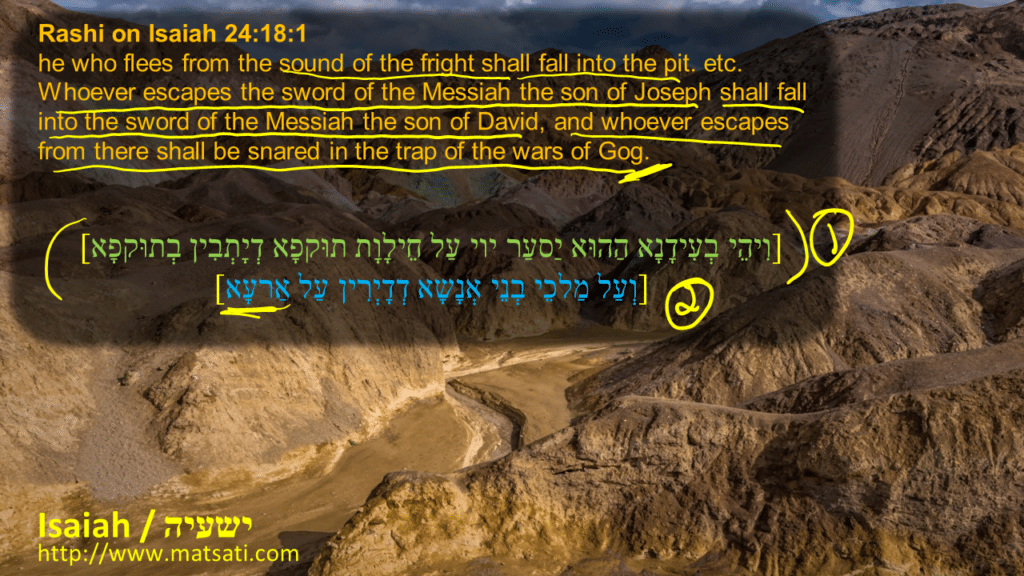
Rashi on Isaiah 24:18 Part 1
he who flees from the sound of the fright shall fall into the pit. etc. Whoever escapes the sword of the Messiah the son of Joseph shall fall into the sword of the Messiah the son of David, and whoever escapes from there shall be snared in the trap of the wars of Gog.
Rashi is thinking of the eschatological time frame indicated by the wars of Gog. Here Rashi speaks of the sword of the Messiah son of Joseph, and the sword of the Messiah son of David. Judaism teaches that the Messiah of God will be a God-fearing pious Jew who is both a great Torah scholar and a great leader. He is to be a direct descendant of David. His coming however was not so as to fight a war, we are told according to Zechariah 9 that he will come in meekness and gentleness to bring peace. We are told according to Zechariah 9 that the Messiah would come riding humbly upon a donkey as opposed to a conquering king riding a chariot. Zechariah provides us with a picture of the Messiah king who will deliver the people who is a man of peace for all peoples. The interesting aspect of Rashi’s comment is that of the people escaping the sword of Mashiakh ben Joseph. The interesting thing is that the Scriptures describe the Word of God as the sword of the Spirit. And the idea of escaping the sword of the peaceful coming of the Messiah is a bit difficult to explain in Rashi’s reasoning. One way to think about this however is in the “two Messiah” interpretation, and how the Scriptures consider the Word of God as the Sword of the Spirit. Yeshua came to teach Torah, to teach the way of faithfulness, justice, righteousness, holiness, and truth. His teaching changes hearts to bring peace, the peace of God into our hearts and lives. So those who are caught by the Sword of Mashiakh ben Joseph, will have His Word internalized, and will be transformed for the glory of God. Those who escape the sword of the Messiah, will fall by the sword of the Mashiakh ben David meaning that such a person does not know God, rejected Yeshua’s words, and so will fall by the sword being judged guilty at the end of the age. We note this is true according to Isaiah who speaks of fire and how the sword the LORD will execute judgment upon all men, and many will be those slain by the LORD. (See Isaiah 66:15-16) This will happen when the Yeshua is revealed from heaven in blazing fire with his powerful angels. He will punish those who do not know God and not obey the gospel of Yeshua. (Read 2 Thessalonians 1:7-9) There are many NT references on the coming of the Messiah on the clouds (Daniel 7:13-14, Luke 21:27-28) and the Scriptures describe how the Messiah was given all authority (Matthew 28:18), glory (John 17:10) and a kingdom (Luke 22:29). The NT teachings are consistent with Rashi’s interpretation here on Isaiah 24:18.
The TgJ continues saying, יט מְזָע תְזוּעַ אַרעָא מְנָד תְנוּד אַרעָא פֵירוּק תִתפְרֵיק אַרעָא׃ 24:19 The land is terribly shaken, the land terribly reeleth to and fro, the land is utterly broken. כ אִשתְדַאָה תִשתְדֵי אַרעָא כְרָויָא וּתהֵי אָזְלָא וְאַתיַא כְעַרזְלָא וְיִתקְפוּן עְלַה חֹובַה וְתִיפֹול וְלָא תֹוסִיף לִמקָם׃ 24:20 The land is utterly cast down like a drunkard, she is tottering like a couch: and her sins are heavy upon her: she shall fall, and rise no more. כא וִיהֵי בְעִידָנָא הַהוּא יַסעַר יוי עַל חֵילָוָת תוּקפָא דְיָתְבִין בְתוּקפָא וְעַל מַלכֵי בְנֵי אְנָשָא דְדָיְרִין עַל אַרעָא׃ 24:21 And it shall come to pass at that time, that the Lord shall punish the mighty host that is dwelling in power, and the kings, the sons of men, who are dwelling upon the earth. (TgJ) Here in Isaiah 24:19-20 the TgJ is describing the earth as being shaken, and the parallel is to the שיכר (drunkard) who cannot walk and stumbles uncontrollably. This again is the outcome of those who trust in this world and its riches as opposed to those who trust in the Lord God Almighty. Isaiah 24:21 states can be divided into two clauses:
[וִיהֵי בְעִידָנָא הַהוּא יַסעַר יוי עַל חֵילָוָת תוּקפָא דְיָתְבִין בְתוּקפָא]
[וְעַל מַלכֵי בְנֵי אְנָשָא דְדָיְרִין עַל אַרעָא׃]
The first clause writes saying, “it will be at the appointed time God will inspect the army of power which is in power” and the second clause writes “and upon the kings sons of men which are upon the earth.” C. W. H. Pauli translates this as “And it shall come to pass at that time, that the Lord shall punish the mighty host that is dwelling in power, and the kings, the sons of men, who are dwelling upon the earth.” The concepts of the “army of power” and “mighty hosts” are consistent with each other. The commentary Torah Ohr 45 has the following interpretation concerning these verses.
Shenei Luchot HaBerit, Torah Shebikhtav, Chukat, Torah Ohr 45
When Israel was freed from the dominance of the angel of death while it received the Torah at Mount Sinai, and lost this freedom due to the sin of the golden calf, the angel Mattatarmolin with the face of an ox took up position on Israel’s left, and Satan and the nations of the world started counting the people. Once the sin had been redressed by means of, amongst other things, the ashes of the red heifer, Torah was restored to being perfect, i.e תורת ידוד תמימה, so that even the מלאך רע יענה אמן, the angel that normally negates, portends evil, had to approve of Israel’s rehabilitation. When this condition does not exist our situation is reversed and all our adversaries are waiting in the wings to applaud our downfall. In the introduction of Midrash Rabbah on Eichah, we find the comment on Daniel 8,12, וצבא תנתן על התמיד בפשע, “and a set time (army) will be allotted to the daily sacrifice because of sin.” צבא means Malchiyut, i.e. dominance by other nations. We know this from Isaiah 24,21, יפקוד ה’ על צבא המרום במרום “In that day the Lord will punish the host of heaven in heaven and the kings of earth on earth.” The תמיד we referred to in Daniel, is a reference to Israel, since it is written והגית בו יומם ולילה, “occupy yourself with it by day and by night,” i.e. תמיד, constantly (Joshua 1,8). The word בפשע refers to the sin of neglecting Torah. Any time Israel throws Torah to the ground, other nations will prevail over us, since it says ותשלך אמת ארצה “when it throws truth to the ground.” We know that אמת, truth, is a reference to Torah: אמת קנה ואל תמכור, “buy the truth, never sell it!” (Proverbs 23,23). If you throw words of Torah to the ground other nations will immediately prevail against you. Confirmation of this is found in Daniel 8,12, ועשתה והצליחה, “it will act and succeed.” Since Gentiles do not have Torah, the verse must refer to the Gentiles prevailing over Israel.
We note something about the rabbinic commentary, how the rabbis state that when the people of Israel received the Torah at Sinai, they were freed from the dominance of the angel of death. However, when the people sinned with the golden calf, they lost this freedom. This reveals to us how the Torah is powerless to save a person from sin. This is why the Apostle Paul wrote what he did in Romans, that the Torah makes one aware of sin and guilt but does not save. This does not mean that the Torah is not the way of life but illustrates the weakness of man to overcome sin without the help of God and His indwelling Spirit by faith in the Messiah Yeshua. In addition, note there was something external that was needed in order to restore the people. The rabbis say this is the ashes of the red heifer which purify and make one clean. This parallels what we read concerning Yeshua, as he said in John 15:3, “You have already been pruned and purified by the message I have given you. English Standard Version Already you are clean because of the word that I have spoken to you” and in 1 John 1:7. “But if we walk in the light, as he is in the light, we have fellowship with one another, and the blood of Jesus, his Son, purifies us from all sin.” This is an external act of God who cleanses and purifies us. This is how the ashes of the red heifer are understood, the ashes render the one who collects the ashes unclean. When the ashes are placed in water, they become waters of purification, making one clean and this is taken by faith in God and His Holy Word. This is an act of God, and this parallels what Yeshua did, such that by faith we believe and are purified, made clean. Being made pure, and having the presence of God dwelling within by faith in Yeshua, the Word of God becomes the way of life, and the rabbis say that it is written והגית בו יומם ולילה, “occupy yourself with it by day and by night,” i.e. תמיד, constantly (Joshua 1:8). The commentary also states, “Any time Israel throws Torah to the ground, other nations will prevail” and this is relevant for our lives today, as God’s word is to be studied, memorized, and applied to our lives for the glory of God.
The TgJ continues saying the following, כב וְיִכנְשוּנוּנוּן מִכנָש לְבֵית אְסִירֵי וִיגוּנוּנוּן לְבֵית עְגָנָא וּמִסְגֵי יֹומִין יֵיעֹול דֻכרָנְהֹון׃ 24:22 And they shall be utterly gathered for the prison, and they shall be shut up in the dungeon, and after many days they shall be remembered. כג וְיִבַהתוּן דְפָלְחִין לְסֵיהְרָא וְיִתכַנעוּן דְסָגְדִין לְשִמשָא אְרֵי תִתגְלֵי מַלכוּתָא דַיוי צְבָאֹות בְטוּרָא דְצִיֹון וּבִירוּשלַם וּקֳדָם סָבֵי עַמֵיה בִיקָר׃ 24:23 And they shall be confounded that worship the moon, and they shall be ashamed that worship the sun; because the power of the Lord of hosts shall be revealed in mount Sion, and before the elders of his people in glory. (TgJ) The ancient Canaanite religions dealt with the sun and the moon. The Ugaritic tablets are particularly useful for understanding the nature of the religion in Bronze Age Canaan; Egyptian, Mesopotamian, Hurrian, and Hittite ideas would have influenced, as well as been affected by, Ugaritic traditions (Smith, God in Translation, 84–86). Furthermore, all the existing texts are connected with royal or official religious institutions, not the religion of the general population. People throughout Canaan worshiped many deities, as indicated by theophoric names, toponyms, biblical texts, and inscriptions; over 150 Canaanite gods can be found in the Ugaritic texts (see Pardee, Ritual and Cult at Ugarit). The structure of the Canaanite pantheon can be compared to a divine family or governmental hierarchy, and the concept of the assembly of gods seen throughout the ancient Near East can be clearly seen in the Ugaritic myths. (Beth Steiner, “Canaanite Religion,” ed. John D. Barry et al., The Lexham Bible Dictionary (Bellingham, WA: Lexham Press, 2016).) There is a common Semitic term for God, El (אל) which is described as the high god and head of the divine assembly. The text states that Baal rebelled against El and took over as chief god. There are three main sections of the Ugaritic myths concerning Baal (i) describes the building of his temple or palace on Mount Zaphon, (ii) describes his conflict with the god of the Underworld, Mot, by whom he is killed and must rise again to ensure the renewal of the world’s fertility. (Resurrection theme) Baal was known as the “mightiest of the heroes” and “victorious Baal.” And (iii) describes his fight for kingship with Yam, the god of the sea (and rivers) who reflects the chaotic aspect of water. Yam often occurs with (and is probably identified with) various sea serpents. This myth celebrates Baal’s kingship and might against powers of chaos and destruction, and may also show his protection of sailors, as votive anchors were found in his temple in Ugarit (see Day, Yahweh and the Gods, 135). Here the TgJ describes how those who worship the moon will be confounded, and those who worship the sun will be ashamed. The reason being the Lord God Almighty will cast these false gods down upon whom the people trust. It is in these things that we find the context of the sun and moon being ashamed according to Isaiah 24:19-21.
Midrash Tanchuma and Ibn Ezra have the following to say concerning these verses (Isaiah 24:19-21)
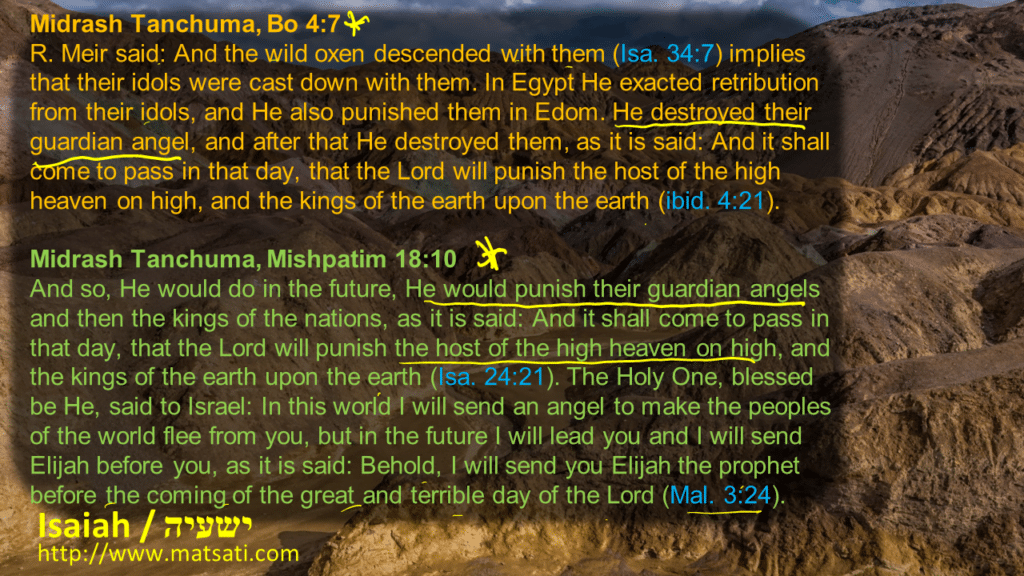
Midrash Tanchuma, Bo 4:7
R. Meir said: And the wild oxen descended with them (Isa. 34:7) implies that their idols were cast down with them. In Egypt He exacted retribution from their idols, and He also punished them in Edom. He destroyed their guardian angel, and after that He destroyed them, as it is said: And it shall come to pass in that day, that the Lord will punish the host of the high heaven on high, and the kings of the earth upon the earth (ibid. 4:21).
Midrash Tanchuma, Mishpatim 18:10
And so He would do in the future, He would punish their guardian angels and then the kings of the nations, as it is said: And it shall come to pass in that day, that the Lord will punish the host of the high heaven on high, and the kings of the earth upon the earth (Isa. 24:21). The Holy One, blessed be He, said to Israel: In this world I will send an angel to make the peoples of the world flee from you, but in the future I will lead you and I will send Elijah before you, as it is said: Behold, I will send you Elijah the prophet before the coming of the great and terrible day of the Lord (Mal. 3:24).
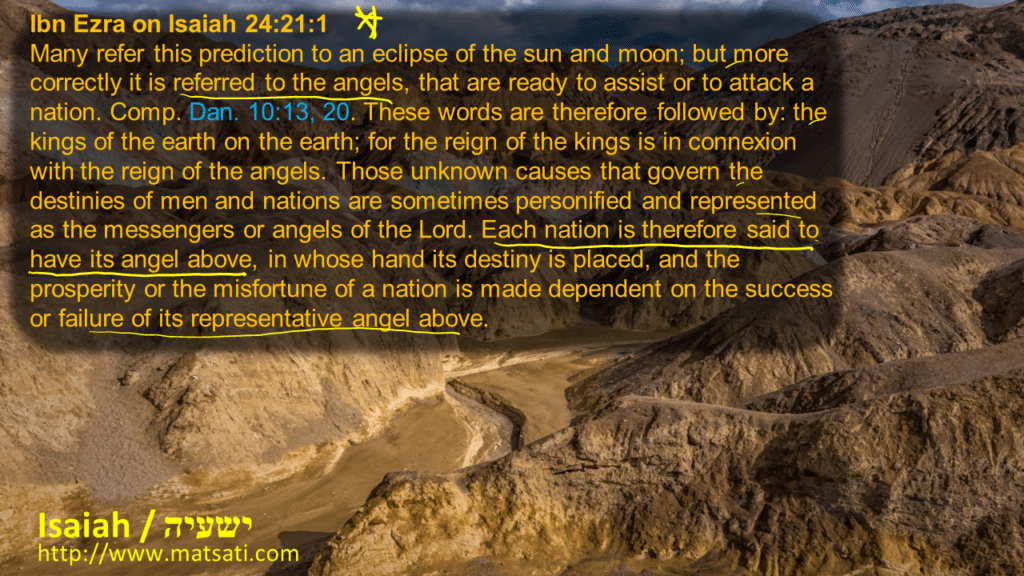
Ibn Ezra on Isaiah 24:21 Part 1
Many refer this prediction to an eclipse of the sun and moon; but more correctly it is referred to the angels, that are ready to assist or to attack a nation. Comp. Dan. 10:13, 20. These words are therefore followed by: the kings of the earth on the earth; for the reign of the kings is in connexion with the reign of the angels. Those unknown causes that govern the destinies of men and nations are sometimes personified, and represented as the messengers or angels of the Lord. Each nation is therefore said to have its angel above, in whose hand its destiny is placed, and the prosperity or the misfortune of a nation is made dependent on the success or failure of its representative angel above.
We note how the Midrash also interprets Isaiah 24:21 as we did state that their idols are cast down, their guardian angel is destroyed, and the Lord punishes the host of the high heaven on high, as a reference to these things. Midrash Tanchuma states that the destruction of the spiritual forces that are over the nations is connected to the Lord God sending an angel to cause the people of the world to flee from Israel, and the Lord God will lead Israel sending Elijah before them quoting from Malachi 3:23. This is a pronouncement of the forerunner to the Messiah, John the Baptist. The purpose is given according to Malachi 4:6 “And he shall turn the heart of the fathers to the children, and the heart of the children to their fathers; lest I come and smite the earth with a curse.” Note the connection here to the text from Isaiah through the curse on the earth which would lead to its destruction (Isaiah 24). We note that the Neviim (Prophets) section of the Tanakh ends with the judgment of a curse, known as cherem (חֵ֫רֶם). This is a reference to the devoted thing — an object (or person) that is devoted to the God of Israel, whether for cultic use or for destruction. This is the worst type of curse, one of utter destruction. The rabbis, in their reading of the Book of Malachi in the synagogue, do not like to conclude the reading with a curse. After reading verse 6, they repeat verse 5 so that it will not close with a curse. We also note that 400 years later, the blessing of the coming of the Messiah of God had come, to restore the relationship of the world with the Creator God, for those who would believe in Him. We note how Ibn Ezra does not interpret these things as spiritual forces who are deceiving the nations. He considers these as allusions to the personification of unknown causes which govern the destinies of men and nations. He utilizes this concept to describe the angel above who is judged based on the angel’s success or failure. We note again how these things draw out what the Torah speaks of those who bring a curse upon oneself through the rejection of God’s Holy word. This leads to the verse in Devarim / Deuteronomy 28:25, כה יִתֶּנְךָ יְהֹוָה | נִגָּף לִפְנֵי אֹיְבֶיךָ בְּדֶרֶךְ אֶחָד תֵּצֵא אֵלָיו וּבְשִׁבְעָה דְרָכִים תָּנוּס לְפָנָיו וְהָיִיתָ לְזַעֲוָה לְכֹל מַמְלְכוֹת הָאָרֶץ 28:25 The LORD shall cause thee to be smitten before thine enemies: thou shalt go out one way against them and flee seven ways before them: and shalt be removed into all the kingdoms of the earth. (KJV) This is the outcome of those who reject the word (instructions) of God. According to the Talmud Bavli Pesachin 68a, the Gemara states, “the verse referring to the sun and the moon being ashamed before the glow of the Divine Presence, it is referring to the World-to-Come, which is an entirely different world; and where it says that their light will increase, it is referring to the days of the Messiah.” Ultimately the application of these things for our lives today, from Isaiah 24, is to the importance of God’s word and preparing for that day. These things also reveal to us how there are spiritual forces working in the background to deceive. This is the spiritual war that Paul calls “the day of evil” in Ephesians 6:13. Paul tells us in this passage to be strong in the Lord and to stand firm. How does one stand firm if he or she does not do so by faith in God’s holy word? (Ephesians 6:10-13). In addition to this, Peter tells us to resist the devil, standing firm in the faith (1 Peter 5:9). Peter is teaching us that faith in God is the key to standing firm in the midst of the day of evil. John tells us also not to be afraid when we are in tribulation, because Yeshua has already overcome the world! (John 16:33) All of these things support the NT context concerning the days of the Messiah, Faith in God our Father in heaven, and the Torah centric principle of God dwelling in our midst through the indwelling power of God by His Holy Spirit!
